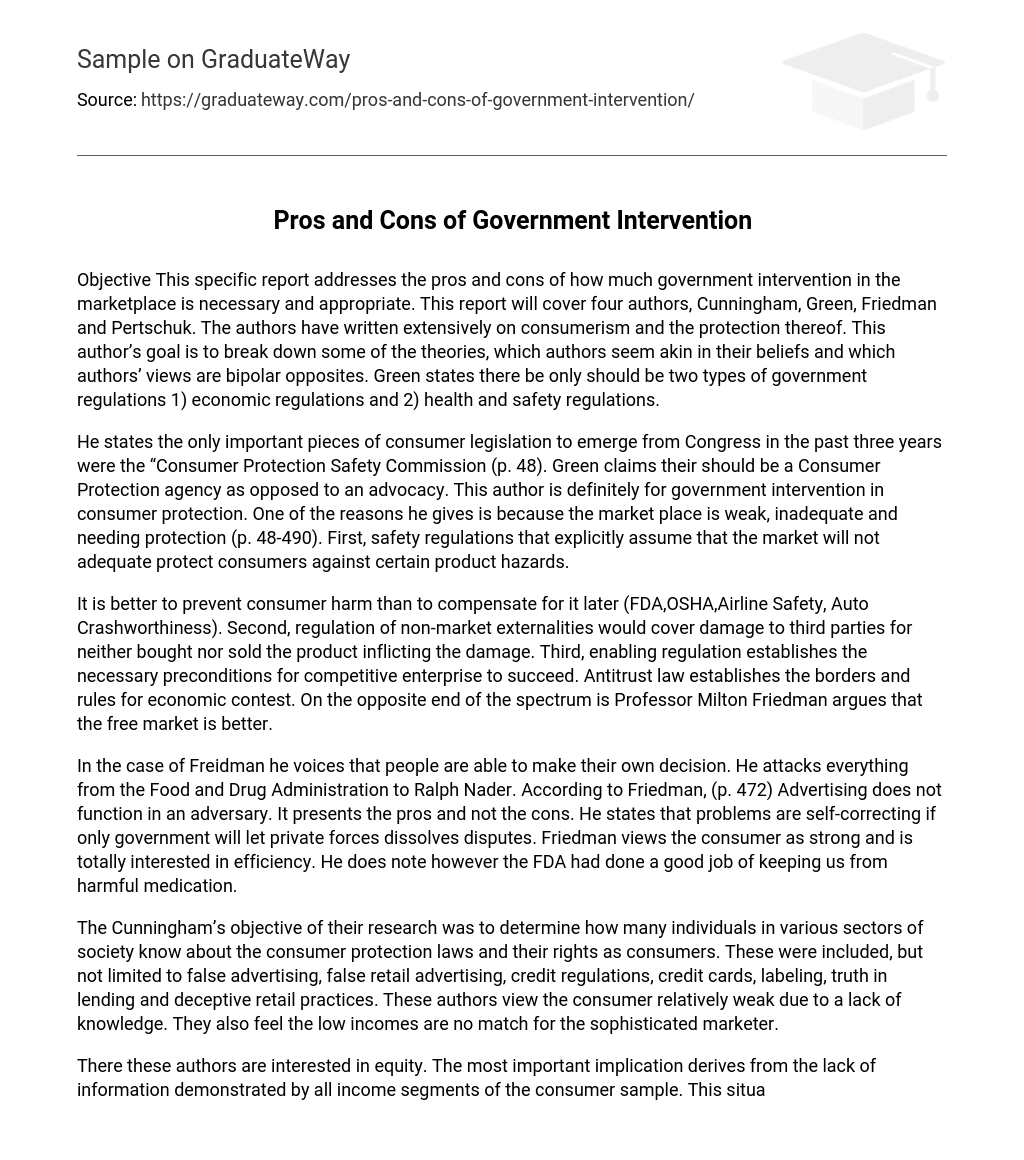Objective This specific report addresses the pros and cons of how much government intervention in the marketplace is necessary and appropriate. This report will cover four authors, Cunningham, Green, Friedman and Pertschuk. The authors have written extensively on consumerism and the protection thereof. This author’s goal is to break down some of the theories, which authors seem akin in their beliefs and which authors’ views are bipolar opposites. Green states there be only should be two types of government regulations 1) economic regulations and 2) health and safety regulations.
He states the only important pieces of consumer legislation to emerge from Congress in the past three years were the “Consumer Protection Safety Commission (p. 48). Green claims their should be a Consumer Protection agency as opposed to an advocacy. This author is definitely for government intervention in consumer protection. One of the reasons he gives is because the market place is weak, inadequate and needing protection (p. 48-490). First, safety regulations that explicitly assume that the market will not adequate protect consumers against certain product hazards.
It is better to prevent consumer harm than to compensate for it later (FDA,OSHA,Airline Safety, Auto Crashworthiness). Second, regulation of non-market externalities would cover damage to third parties for neither bought nor sold the product inflicting the damage. Third, enabling regulation establishes the necessary preconditions for competitive enterprise to succeed. Antitrust law establishes the borders and rules for economic contest. On the opposite end of the spectrum is Professor Milton Friedman argues that the free market is better.
In the case of Freidman he voices that people are able to make their own decision. He attacks everything from the Food and Drug Administration to Ralph Nader. According to Friedman, (p. 472) Advertising does not function in an adversary. It presents the pros and not the cons. He states that problems are self-correcting if only government will let private forces dissolves disputes. Friedman views the consumer as strong and is totally interested in efficiency. He does note however the FDA had done a good job of keeping us from harmful medication.
The Cunningham’s objective of their research was to determine how many individuals in various sectors of society know about the consumer protection laws and their rights as consumers. These were included, but not limited to false advertising, false retail advertising, credit regulations, credit cards, labeling, truth in lending and deceptive retail practices. These authors view the consumer relatively weak due to a lack of knowledge. They also feel the low incomes are no match for the sophisticated marketer.
There these authors are interested in equity. The most important implication derives from the lack of information demonstrated by all income segments of the consumer sample. This situation suggests that what is needed is not more and tougher laws, but rather more information made available to ore individuals concerning their rights as consumers. The present research has demonstrated that one other variable is important: with the exception of a few areas of the law, both consumers and attorneys know very little about their rights as consumers.
This was particularly true in areas such as door-door selling, false or deceptive advertising, false or deceptive retail practices. More and better information concerning consumers’ rights must be provided to individuals of all economic strata (p. 167). Pertschuk’s article reads along the same lines as Freidmans. In his Revolt in Regulation he seems more concerned about the cost of regulation to the tax payer than actual regulation itself. To be quite honest I found his article to be rambling and sometimes confusing.
He does talk about working smarter and not harder and he seems s to have a great interest in business and the business world. But there is no question he is a bureaucrat and most of the time they end up with just theories. Subjective I found most of these articles very interesting, but I was curious why they were dated back so far. Has their not been any interesting material written on consumerism in the last few years? Also, it’s a new day. And it’s a new time, 2010. In my opinion safety supersedes consumerism. Yes, Americans should be vigilant about the water they drink, the food they eat and the transportation they use.
But at the same time I feel better knowing that each state has a Homeland Security Team. Therefore, it was difficult for me to read the articles that absolutely eschew government intervention. I own a beautiful blonde lab named Gracie. I couldn’t possibly love her anymore than what I do. In recent years the government did a recall on dog food. Everyone panicked including me. Fortunately for us, Gracie did not eat that kind of food. But if she had, well, it would be nice to know someone was looking out for us. Bibliography Green, M. J. (1974).
Appropriateness and Responsiveness: Can the Government Protect the Consumer? Journal of Economic Issues, 9, 309-328 Friedman, M (1980). Who Protects the Consumer? In M. Friedman, Free to Choose: A Personal Statement (pp. 189-227). New York: Harcourt Brace Jovanovich Pertschuk M. Lessons in Consumer Relations: Learned and Unlearned. In M. Pertschuk, Revolt in Resolution (pp. 137 – 151) Cunningham, W. H. & Cunningham. I. C. M. (1976). Consumer Protection: More Information or More Regulation? Journal of Marketing, 40, 63-68





